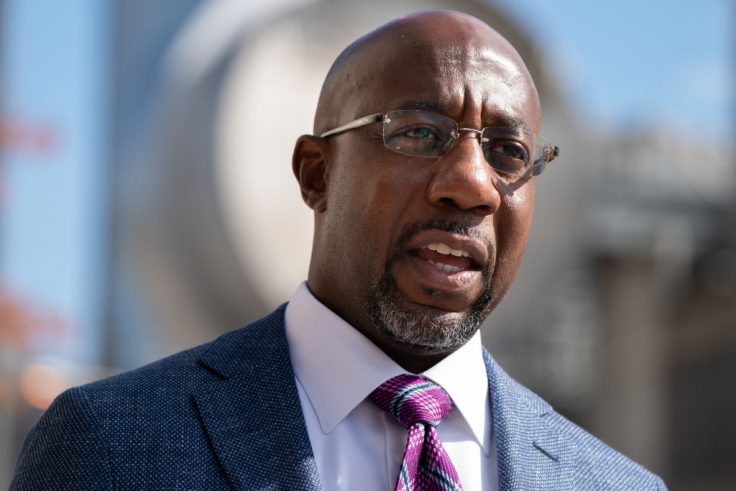Warnock Fundraises With Steyer After Voting for Legislation That Poured Billions Into Green Energy
Events come amid global surge in energy prices as Democrats vilify fossil fuels

Sen. Raphael Warnock (D., Ga.) raked in cash from wealthy green energy moguls at a series of San Francisco fundraisers last weekend, a month after voting to pass legislation that steered billions to climate initiatives and the green energy industry.
During his West Coast fundraising swing, the senator partied with billionaire investor Tom Steyer, biofuels CEO Wade Randlett, and "Defund the Police" advocate Meena Harris, the niece of Vice President Kamala Harris, according to photos. Steyer cohosted an event for Warnock in San Francisco on Saturday, along with NextGen America board member Andrea Evans, according to an invitation for the fundraiser. Randlett cohosted an event for Warnock on Friday.
The parties came weeks after Warnock voted for the Biden administration’s budget reconciliation bill—officially dubbed the Inflation Reduction Act—and highlight the cozy relationship between Democratic political leaders and the lucrative green tech industry. The legislation poured billions into green energy initiatives and is expected to benefit industries in which Steyer is an investor, according to analysts. The fundraisers also come amid a global surge in energy prices, with many Americans struggling to pay utility bills, and as Democratic lawmakers continue to vilify the fossil fuel industry.
Steyer, a Democratic donor who ran a short-lived campaign for president in 2020, launched a "climate investment fund" called Galvanize in 2021 with a goal of investing "billions" into decarbonization companies. The fund’s reported investments include Regrow Ag, a startup that "aims to help accelerate the shift to climate-friendly farming" and Arable, which seeks to "create a more sustainable food supply."
Both Regrow Ag and Arable were named as companies that are likely to benefit from a $20 billion earmark in the federal spending bill, according to an analysis published by the clean energy investment firm G2 Venture Partners on Aug. 17, the day after the bill was signed by President Joe Biden.
The bill "has earmarked $20B to (1) target methane and nitrous oxide emission reduction (e.g. Arable, Trace Genomics), (2) improve soil carbon and nitrogen content (e.g. Pivot Bio), and (3) avoiding / sequestering GHG emission (e.g. ProducePay, Regrow, Cloud Agronomics)," wrote G2 Venture Partners.
Steyer praised the passage of the bill as the "culmination of a decade of advocacy and persistence." Earlier this month, he attended a party at the White House celebrating the legislation.
The Friday fundraiser was cosponsored by Randlett, a biofuels mogul and CEO of the transportation fuels division at General Biofuels. The spending bill extended the biodiesel tax credit and was praised by leaders in the biofuels industry.
"This bill represents the most significant federal commitment to low-carbon biofuels since the Renewable Fuel Standard was expanded by Congress in 2007," said Renewable Fuels Association president Geoff Cooper in a statement applauding the bill.
Andrea Evans, a board member at Steyer’s nonprofit group NextGen, also cohosted the Saturday Warnock fundraising event.
The Inflation Reduction Act has faced some criticism, with Republicans arguing that it will raise taxes while steering federal funds to Democratic constituencies. Warnock praised the bill, saying it will "help lower costs for families in every corner of our state—all without raising taxes for hardworking Georgia families. That’s a win-win."
Photos from Warnock’s California fundraising trip also show him posing with his arm around Meena Harris, an Instagram lifestyle influencer and the niece of Kamala Harris. Meena Harris is a vocal advocate for the "defund the police" movement.
![]()
"Defund the police and reallocate funds to mental health and social services. This shouldn’t be controversial," wrote Harris in one Twitter post.
She later expanded on this by adding: "To everyone in my mentions policing my language, let me clarify: Defund the police. Defund the police. Defund the police. Defund the police. Defund the police. Defund the police. Defund the police. Defund the police. Defund the police. Defund the police. Defund the police."
The senator is the party’s top fundraiser for the midterm cycle, pulling in a whopping $17 million last quarter in his competitive faceoff against Republican challenger Herschel Walker.
No comments:
Post a Comment